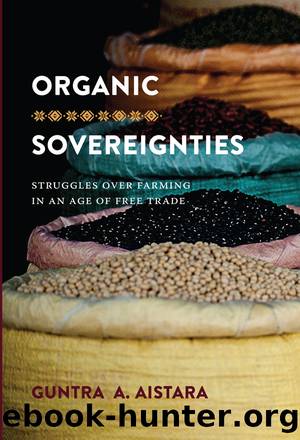Organic Sovereignties by Guntra A. Aistara

Author:Guntra A. Aistara [Aistara, Guntra A.]
Language: eng
Format: epub
Tags: Political Science, International Relations, Trade & Tariffs, Social Science, Anthropology, General, Technology & Engineering, Agriculture, Organic
ISBN: 9780295743103
Google: K0F2tAEACAAJ
Barnesnoble:
Goodreads: 36867853
Publisher: University of Washington Press
Published: 2018-01-15T01:02:44+00:00
CHAPTER FIVE
Cacophonous Harmonies
WITHOUT land and seeds, one cannot farm. Yet land and seeds were more than just inputs or means of production in the organic farming systems in Latvia and Costa Rica. They were the cultural symbols that anchored farmersâ practices in histories of meaning and the axes around which farmers engaged with local ecological diversity. They served as the cornerstones for innovative reinventions of traditions through building networks with other farmers and other species, in the process creating and maintaining place-based forms of cultural and biological diversity and forging spaces of autonomy to carry out their practices.
Land in Latvia and seeds in Costa Rica came to be primary sites of struggles over the harmonization of legislation required by Latviaâs joining the EU in 2004, and Costa Ricaâs approval of CAFTA in 2007, precisely because they are intimately tied up with the histories, practices, and future goals and imaginaries of the organic farmers in both countries.
In 2006, Anta described to me her change of attitude toward the EU as a shift âfrom naive optimism to deep pessimism.â Despite concerns over the EU before the referendum, in the first year after accession some organic farmers, having received their first round of EU support payments, were hopeful that entering the EU would open new markets and allow them to benefit more from their land and their ecological practices. Yet farmers like ArtÅ«rs and Anta also saw their right to manage that land slowly erode in the face of numerous new regulations that increased public control over private land and challenged their innovative diversity-based practices. By 2006, in the wake of a scandal over land surveying for the distribution of agri-environment payments, many organic farmers were telling me they would withdraw from the support program altogether (as well as from the EU, if they could).
For organic farmers in Costa Rica, 2007 was marked by both victory and defeat for their semillas criollas. The new Organic Law had passed unanimously in the Legislative Assembly, only to be superseded a few months later by the approval of CAFTA, which required joining the UPOV (International Union for the Protection of New Varieties of Plants) treaty and enforcing breedersâ intellectual property rights on seeds. Organic farmers who had saved and exchanged ancestral seeds for generations or created their own creolized varieties, as Pablo had, resisted the imposition of intellectual property rights that would grant continued access to seeds to private breeders but not farmers.
In both Latvia and Costa Rica the legislative changes associated with harmonization threatened to transform their networked diversities of place. Regionalization under free trade agreements alters property regimes, reconfiguring access to resources and potentially also attachments to place. The harmonization of legislation in these countries reconfigured the bundles of rights and responsibilities that organic farmers had vis-Ã -vis land and seeds as property, both tangible and intangible. These rebundlings brought important consequences for place, personhood, and social relations. Land in Latvia and seeds in Costa Rica were reconfigured though parallel processes of first isolating the
Download
This site does not store any files on its server. We only index and link to content provided by other sites. Please contact the content providers to delete copyright contents if any and email us, we'll remove relevant links or contents immediately.
Craft Beer for the Homebrewer by Michael Agnew(18222)
Marijuana Grower's Handbook by Ed Rosenthal(3663)
Barkskins by Annie Proulx(3355)
Project Animal Farm: An Accidental Journey into the Secret World of Farming and the Truth About Our Food by Sonia Faruqi(3208)
The Plant Messiah by Carlos Magdalena(2918)
Red Famine: Stalin's War on Ukraine by Anne Applebaum(2914)
0041152001443424520 .pdf by Unknown(2841)
Organic Mushroom Farming and Mycoremediation by Tradd Cotter(2681)
In the Woods by Tana French(2579)
Beer is proof God loves us by Charles W. Bamforth(2447)
7-14 Days by Noah Waters(2407)
Borders by unknow(2300)
Between Two Fires by Christopher Buehlman(2295)
Reservoir 13 by Jon McGregor(2291)
Meathooked by Marta Zaraska(2254)
The Art of Making Gelato by Morgan Morano(2245)
Birds, Beasts and Relatives by Gerald Durrell(2210)
The 7 Habits of Highly Effective People: Powerful Lessons in Personal Change (25th Anniversary Edition) by Covey Stephen R(2183)
The Lean Farm Guide to Growing Vegetables: More In-Depth Lean Techniques for Efficient Organic Production by Ben Hartman(2123)
